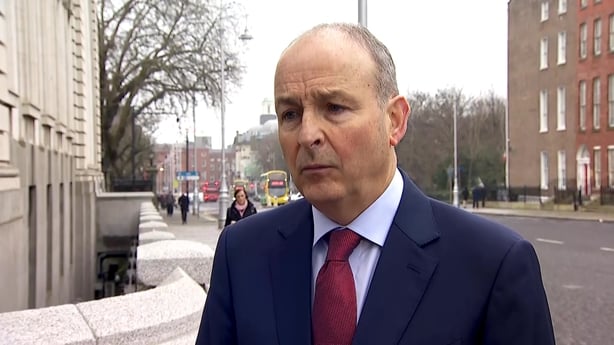The Chair of the US Senate Foreign Relations Committee has called on Ireland to increase its defence spending to ensure the protection of undersea cables.
US Senator Jim Risch, who is the head of the powerful group charged with leading US foreign policy legislation, said that Ireland's "strategic position" comes with "significant responsibility".
"Ireland must increase its defence spending to safeguard vital undersea cables from our shared enemies," the Republican Senator for Idaho said in a statement to RTÉ News.
Around 97% of the world’s communications and internet traffic travels through a network of undersea fiber-optic cables - hosting banking systems, businesses, social media and other forms of critical communications.
We need your consent to load this flourish contentWe use flourish to manage extra content that can set cookies on your device and collect data about your activity. Please review their details and accept them to load the content.Manage Preferences
Three quarters of those cables in the northern hemisphere pass through, or are close to, Ireland.
"Ireland serves as a gateway for the information pathways and critical infrastructure linking Europe and the United States," said Senator Risch.
"With this strategic position comes significant responsibility to address the very real threats to it - we’ve already seen attacks on subsea infrastructure in the Baltic Sea and Taiwan Strait," he added.
Ireland, which is not a member of NATO and remains neutral, spends 0.2% of GDP on defence which is the lowest in Europe.

The Government has said that this year's spending on defence is a record €1.35 billion and a further increase is planned for next year.
Questions have been raised over the safety of the vital undersea cables in and around Irish waters and whose job it is to protect them.
In October 2024, then Tánaiste Micheál Martin said that there was a "risk" of sea cables being sabotaged following increased activity by the Russian navy and associated Russian merchant ships off the south and west coast of Ireland over the past number of years.
The ships have regularly been positioned close to submarine cables in Irish waters, raising concerns that the locations of these cables are being mapped.
Russia has denied that the presence of its military ships off the south, southwest and west coast of Ireland represent a threat.
Work is also under way on the preparation of Ireland’s first National Maritime Security Strategy, which is being led by the Department of Defence.
In a statement, the Department said that it is an "extensive undertaking"’ and it is "not in a position, at this stage, to say when the strategy will be completed and approved by Government".
Ireland's geography does not make it immune to threats
Minister for Health Jennifer Carroll MacNeill said that Ireland should increase its spending on the protection of undersea cables.
Speaking on RTÉ's Morning Ireland, she said the spend should be doubled.
"I certainly as junior Defence Minister [in the previous government], have called for a very significant expansion in our defence budget. We need to essentially double our spending on defence and that is not to change our neutrality," she said.
"As a neutral country, you should in fact spend more on defence, not less on defence, simply as a matter of logic and we don't," she added.
Ms Carroll MacNeill said that Ireland’s location did not necessarily mean that it was protected.
"We need to take defence seriously as critical infrastructure. The rest of Europe is facing cyber and hybrid attacks ... our geography does not mean that we are immune to that.
"I think it's important that we really feel that solidarity with our European family, our European friends, the attacks that they're facing could just as easily happen here and we should be alive to the risk," she said.







